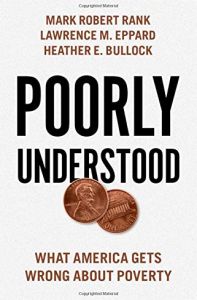Join getAbstract to access the summary!

Join getAbstract to access the summary!
Mark Rank, Heather Bullock and Lawrence Eppard
Poorly Understood
What America Gets Wrong About Poverty
Oxford UP, 2021
What's inside?
American poverty is stereotyped and misunderstood – and that makes addressing it all the more difficult.
Recommendation
Americans tend to make broad assumptions about those who live in poverty: The stereotypical poor person lives in a big city, relies on social assistance, doesn’t have much interest in working and is wholly responsible for his or her circumstances. In reality, write professors Mark Rank, Heather Bullock and Lawrence Eppard, hardworking Americans of all stripes are more vulnerable to impoverishment than they think. This thought-provoking book both corrects misconceptions about the poor in the United States and provides policy prescriptions that can help society address poverty in more productive, fact-based ways.
Summary
About the Authors
Mark Rank is a professor of social welfare at the Washington University in St. Louis. Heather Bullock is a social psychologist, professor of psychology and the director of the Blum Center on Poverty, Social Enterprise, and Participatory Governance at the University of California, Santa Cruz. Lawrence Eppard is a professor at Shippensburg University and the director of the Connors Forum for a Healthy Democracy.


















Comment on this summary